 MyDogBreeds
MyDogBreeds Mountain View Cur is originated from United States but Dingo is originated from Australia. Mountain View Cur may grow 6 cm / 3 inches higher than Dingo. Both Mountain View Cur and Dingo are having almost same weight. Mountain View Cur may live 4 years less than Dingo. Both Mountain View Cur and Dingo has same litter size. Mountain View Cur requires Low maintenance. But Dingo requires Moderate maintenance
Mountain View Cur is originated from United States but Dingo is originated from Australia. Mountain View Cur may grow 6 cm / 3 inches higher than Dingo. Both Mountain View Cur and Dingo are having almost same weight. Mountain View Cur may live 4 years less than Dingo. Both Mountain View Cur and Dingo has same litter size. Mountain View Cur requires Low maintenance. But Dingo requires Moderate maintenance
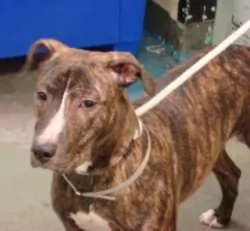 The Mountain View Cur is an American bred dog that resulted from years of deliberate breeding and careful culling of the litters to improve the Mountain Cur into a hunting dog with a better temperament and a stronger hunting instinct. Because of these generations of culling and refining the Mountain View Cur is so uniform within the breed that it is considered a thoroughbred as well as a purebred. Developed at the end of the 1980’s by Michael and Marie Bloodgood. The foundation for their breeding program was the Mountain Cur.
The Mountain View Cur is an American bred dog that resulted from years of deliberate breeding and careful culling of the litters to improve the Mountain Cur into a hunting dog with a better temperament and a stronger hunting instinct. Because of these generations of culling and refining the Mountain View Cur is so uniform within the breed that it is considered a thoroughbred as well as a purebred. Developed at the end of the 1980’s by Michael and Marie Bloodgood. The foundation for their breeding program was the Mountain Cur.
The new Mountain View Cur were meant to be stronger in every way than the original Mountain Cur. They could track, hunt and tree both large and small prey. It’s work ethic is unsurpassed regardless of the weather or terrain. Highly intelligent and motivated the Mount View Cur can use its incredible prey drive to follow the game at any cost. Yet it can be trusted off lease because while hunting the Mountain View Cur will instinctively go to the hunter and check in occasionally.
This breed is ultimate hunter, known for treeing squirrels and racoons. His strongest drive is to please the human he is with. He has a gentle, loving temperament. Because of their desire to please, they are great companion animals as well as hunters. In addition to coons and squirrels, the Mountain View Cur could hunt possum, coyote, pheasants, turkey, hare, grouse, hare and rabbits. They are also willing to fight with lions, bobcats, bears, and wild boars. Surprisingly they can herd as well.
They are a healthy breed and very hearty with a long lifespan. They are extremely popular in the mountains and hills of Appalachia, but they are rare and almost unknown outside the United States. Puppies are very expensive and there is a waiting list that could be very long. The original Mountain View Curs descended from just two Mountain Curs – one male, one female. As the program went on Mountain View Curs were bred to Mountain Views Curs and then other Mountain Curs were added in.
Originally the breed was registered as a part of the Kemmer Stock Breeders Association Registry. Eventually however the breeders of View Curs came to believe that they had an entirely new breed and the American Squirrel and Night Hunters Association was the choice to register the breed in 1995. One year later the Mountain View Cur Registry was founded.
 The Dingo dog was in all probability, introduced to Australia thousands of years ago. He isn’t your usual domesticated dog and in fact it is a feral dog native to Australia.There are stories that suggest that while they may have once been pets, they were abandoned so that they reverted back to their wild state.
The Dingo dog was in all probability, introduced to Australia thousands of years ago. He isn’t your usual domesticated dog and in fact it is a feral dog native to Australia.There are stories that suggest that while they may have once been pets, they were abandoned so that they reverted back to their wild state.
They became pests for Australian farmers, going for their livestock, and huge fences were erected. The different climates in Australia have meant different kinds of Dingo developing, so while the desert ones are like the desert sands - golden yellow to red the alpine ones are rarer and are cream colored.
These wild canines were also introduced to Southeast Asia some 3,500 years ago, however the dog’s exact origin is debatable. There are any number of groups of people who could have brought the dingo to Australia, and among some of these are Indian mariners or maritime hunters.
The dog has been found in many parts of mainland Australia but never became established in Tasmania.There has also been an effort to remove the Dingo from farming areas. It is interesting to note that the first Dingo, referred to as the Australian dog, was registered at the London Zoo in 1828.
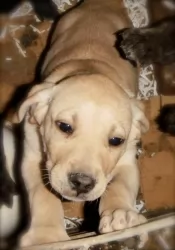 The Mountain View Cur is a rugged, healthy breed that has very little in common with its ancestor the Mountain Cur at least in its looks. The Mountain View Cur is born with no dewclaws while the Mountain Cur has them. The Mountain View Cur is a stronger and more muscular breed as well. They have a flat domed head with ears that are high set and short. Her eyes are dark and prominent, its neck and back strong and muscular, while its chest is deep. Half the pups are born with a bobtail and half have their tales docked. About 10% are black, brindle or brindle and black. They all have white on the feet, chest and muzzle.
The Mountain View Cur is a rugged, healthy breed that has very little in common with its ancestor the Mountain Cur at least in its looks. The Mountain View Cur is born with no dewclaws while the Mountain Cur has them. The Mountain View Cur is a stronger and more muscular breed as well. They have a flat domed head with ears that are high set and short. Her eyes are dark and prominent, its neck and back strong and muscular, while its chest is deep. Half the pups are born with a bobtail and half have their tales docked. About 10% are black, brindle or brindle and black. They all have white on the feet, chest and muzzle.
 An interesting fact with these fascinating feral dogs, is that like humans, they’ve got rotating wrists. This characteristic of theirs allows them to use their paws much like the human hand to catch their prey. A domesticated Dingo can therefore learn how to open doors.
An interesting fact with these fascinating feral dogs, is that like humans, they’ve got rotating wrists. This characteristic of theirs allows them to use their paws much like the human hand to catch their prey. A domesticated Dingo can therefore learn how to open doors.
The Dingo is a medium sized dog standing at roughly 52 – 60cm in height, measuring up to 1.2 meters in length and weighing roughly between 23 to 32kg.
He has long canine teeth, a long muzzle, upright ears and a long, thick tail. The coat is essentially one color, sandy, white, cream, tan or black and sometimes there are white markings on the chest, the paws and around the muzzle.
The fur is typically shortish and thick — though the hair's thickness and length will depend on the climate of the area. The Dingo is a moderate shedder and a good brushing of the coat twice a week will keep the thick coat shiny and healthy.
These wild canines are social animals, and in the wild they live in packs. There are some that opt to live on their own.
They’e territorial, but they are able to share their living space with humans. They’re generally shy around humans, but a Dingo that is trained and socialized can get along well with children and pets in the home.
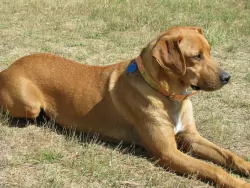 Very child friendly, playful and gentle
Very child friendly, playful and gentle
Scent and well-disciplined self-control
This breed is designed to work and to hunt. They are happiest when they have a job or are in the woods with you. They have excess energy and need space. They will not do well as a 24 hour inside dogs. They need space to run and hunt.
Highly intelligent, excellent ability to learn whatever you want to teach them.
 Dingoes have been domesticated successfully. Some people swear by them as making a fantastic pet. However, they’re wild dogs and can be unpredictable.
Dingoes have been domesticated successfully. Some people swear by them as making a fantastic pet. However, they’re wild dogs and can be unpredictable.
There are others who have tried to keep the Dingo as a pet but who have discarded them when they proved to be a danger in the home.
Dingoes can be trained but they’re high energy dogs and require a lot of exercise. How do you feel about owning a Dingo as a pet? Many people feel that its not fair to bring an essentially wild animal into your home. They feel that there are plenty of rescue dogs dying for a home without human beings searching in the wilds for an unusual pet, and regretting it later on.
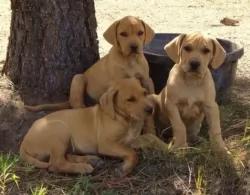 The Mountain View Cur is a very healthy breed without a lot of genetic issues due to the purity and isolation of the breed. No genetic deformities or illness. They are susceptible to a few health concerns.
The Mountain View Cur is a very healthy breed without a lot of genetic issues due to the purity and isolation of the breed. No genetic deformities or illness. They are susceptible to a few health concerns.
Bloat – like most larger dogs, the Mountain View Cur is susceptible to bloat. This occurs when the dog’s internal organs, stomach and intestines become inverted and twisted. This can occur when the dog eats a large meal immediately before or after strenuous exercise.
 The Dingo is a long-lived dog and you can expect your Dingo to live till anything between 15 and 20 years.
The Dingo is a long-lived dog and you can expect your Dingo to live till anything between 15 and 20 years.
When it comes to health issues, they are robust and resilient, having less medical problems to contend with than your regular dog.
However if you see that your Dingo is not his usual robust, energetic self, get him to the vet as soon as you can.
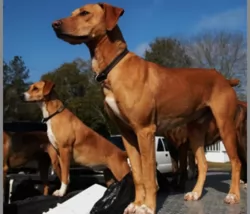 The Mountain View Cur puppy after 12 weeks of age will need to eat 3 meals per day until they are 6 months old. From 6 months to one year they need 2 meals a day. They need high quality dry dog food made especially for puppies that will become large dogs.
The Mountain View Cur puppy after 12 weeks of age will need to eat 3 meals per day until they are 6 months old. From 6 months to one year they need 2 meals a day. They need high quality dry dog food made especially for puppies that will become large dogs.
An adult Mountain View Cur can eat only once a day and be healthy. They need a high quality dry food for large dogs.
Extremely healthy breed with stamina and speed.
The Mountain View Cur is a hunter and an extremely active one at that. They also have herding tendencies. Though they are not hyper, they need a lot of exercise. They also need a job. They want nothing more than to please their person, but they need a job to stimulate both his body and mind. He needs daily walks and a fenced yard to run in. They are good at agility, search and rescue, herding, field trials, police work, and hunting.
 Caring for your Dingo will be different to caring for your usual pet dog. You have to remember the Dingo is an ancient, wild species with some unique characteristics. Having a Dingo as a pet and companion may not be an easy task, and it is why many people selfishly dump their Dingoes – they didn’t quite live up to what they had in mind.
Caring for your Dingo will be different to caring for your usual pet dog. You have to remember the Dingo is an ancient, wild species with some unique characteristics. Having a Dingo as a pet and companion may not be an easy task, and it is why many people selfishly dump their Dingoes – they didn’t quite live up to what they had in mind.
Your Dingo, just like any other dog you’d have, will require training and socialization, and the earlier the better. No training will simply mean you having an unruly pet in the home.
Your Dingo can be fed just like you would with your other dogs. You can feed him quality dog kibble as his main diet, but you can also add in cooked rice, vegetables and chicken. Your Dingo is essentially a wild dog, so you will definitely want to include some raw meat into his diet from time to time as well.
A Dingo is used to running free so he will require plenty of outdoor exercise. He can also be put on a leash and taken for a walk. He’ll love joining you in your activities such as running alongside you as you jog or cycle. He can adapt to life in the city if he is well exercised but he isn’t suited to a small home or garden.